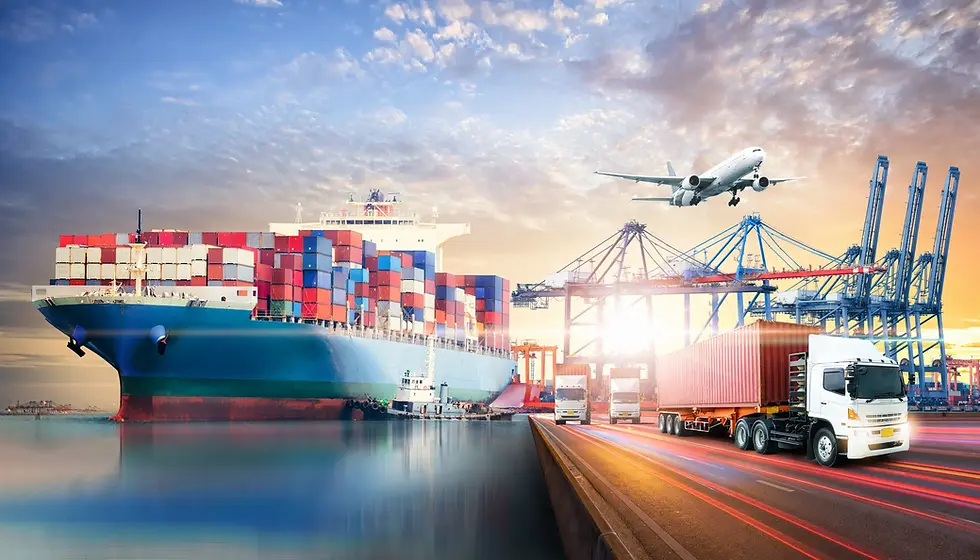The Role of Freight Forwarders in Global Supply Chains
- mmgvanandman
- Nov 6, 2025
- 4 min read

Global supply chains connect businesses, suppliers, and consumers worldwide. They ensure goods move smoothly from one place to another, often crossing multiple borders. Managing this complex process can be challenging for companies of all sizes. That’s where freight forwarding services come in. These services simplify global trade by coordinating every stage of the shipping process. From documentation to customs clearance, freight forwarders make sure your goods reach their destination safely and on time.
Understanding Global Supply Chains
A global supply chain is the network that manages the production and delivery of goods worldwide. It involves sourcing raw materials, manufacturing products, and transporting them to final destinations. This system relies on efficiency, timing, and coordination. Even a slight delay in one stage can affect the entire chain.
To avoid disruptions, companies rely on experts who can efficiently handle the movement of goods. That’s why freight forwarding services are vital in keeping global supply chains running smoothly. They act as the link between shippers, transport companies, and customs authorities.
What Are Freight Forwarders?
Freight forwarders are professionals who organise and manage the transportation of goods. They don’t usually own ships or planes. Instead, they coordinate logistics by partnering with shipping lines, airlines, and trucking companies.
Their main goal is to make shipping easy for businesses. They take care of everything — from picking up the goods to delivering them safely to the destination. Using freight forwarding services allows companies to save time, reduce costs, and focus on their core business.
The Key Role of Freight Forwarders in Global Trade
Freight forwarders act as intermediaries between exporters and importers. They ensure goods move efficiently through every stage of transportation. Their role includes planning routes, managing documentation, and ensuring compliance with international regulations.
Without them, businesses would have to handle multiple processes in-house. That means dealing directly with shipping companies, customs authorities, and warehouses. Freight forwarding services help companies avoid this stress by managing all logistics under one roof.
Main Functions of Freight Forwarders
Freight forwarders perform several key functions that keep international trade moving:
Transportation Arrangement:
They choose the best routes and modes of transportation for goods — whether by sea, air, or land.
Customs Clearance:
They handle paperwork, duties, and taxes to ensure smooth customs clearance.
Documentation:
They prepare and verify shipping documents, including bills of lading, invoices, and certificates.
Cargo Insurance:
They help arrange insurance to protect goods against damage or loss during transit.
Warehousing:
They can store goods temporarily before or after shipment.
These functions make freight forwarding services essential to the efficiency of global trade.
How Freight Forwarding Works
The process of freight forwarding involves several steps that ensure goods are transported securely and on time.
Planning the Shipment:
The freight forwarder reviews the client’s needs, destination, and cargo type. They then plan the best route and mode of transport.
Booking Transportation:
They book space with shipping lines, airlines, or trucking companies.
Documentation and Customs:
All necessary paperwork and customs declarations are completed. The forwarder ensures compliance with local and international laws.
Cargo Handling:
The goods are packed, labelled, and loaded for transport.
Monitoring Shipment:
The freight forwarder tracks the shipment throughout the journey to ensure it arrives on time.
Delivery:
Once the goods arrive, they handle the final delivery to the recipient.
Every stage of this process is carefully managed by freight forwarding services to avoid delays or losses.
Details to Know About Freight Forwarding
Freight forwarding is not just about moving goods. It’s about managing logistics smartly. A freight forwarder must be familiar with shipping laws, trade agreements, and customs procedures.
They also need strong networks with carriers and transport operators worldwide. This network helps them find cost-effective routes and solutions. The best freight forwarding services also use digital tracking tools to provide real-time shipment updates.
Benefits of Using Freight Forwarding Services
Working with freight forwarders offers many advantages:
Saves Time and Effort:
You don’t have to deal with the complexities of international shipping.
Reduces Costs:
They can negotiate better rates with carriers due to their large shipping volumes.
Ensures Compliance:
They handle all the legal and customs paperwork.
Improves Reliability:
Your goods are less likely to get delayed or lost.
Offers Flexibility:
Whether you’re shipping small packages or large cargo, they can handle it.
By relying on freight forwarding services, businesses can focus on their operations while ensuring efficient delivery.
Key Aspects of Freight Forwarding Services
There are a few key areas you should understand before choosing a freight forwarder:
Mode of Transport: Sea, air, and land freight each have unique advantages.
Transit Time: Different routes and carriers affect delivery speed.
Cost Factors: Pricing depends on weight, size, and shipping distance.
Insurance Options: Coverage protects against damage or delays.
Technology: Modern tracking systems improve visibility and communication.
These aspects make freight forwarding services highly customisable for businesses of all sizes.
What to Ask a Freight Forwarding Professional
Before hiring a freight forwarder, it’s essential to ask the right questions:
How long have you been in the business?
What shipping routes and carriers do you work with?
Do you offer real-time tracking services?
Can you handle customs clearance and documentation?
What type of insurance do you recommend for my goods?
What are your rates, and do you have any hidden charges?
Can you handle urgent or time-sensitive deliveries?
Asking these questions ensures you choose freight forwarding services that meet your specific needs.
Conclusion
Global supply chains are the backbone of modern trade. They rely on coordination, timing, and expertise. Freight forwarders bring all these elements together. They plan, organise, and manage the movement of goods between countries with efficiency and reliability. Whether you’re a small business or a large corporation, using freight forwarding services can make a huge difference. They help you save time, reduce costs, and ensure your products reach their destinations safely.

Comments